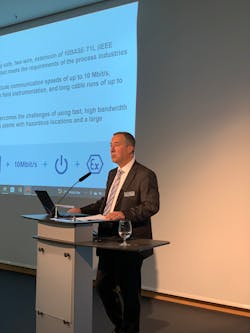Conformance testing verifies the Ethernet-APL physical layer functionality by checking that the different port types properly adhere to the relevant specifications. The EtherNet/IP communication network functionality is also confirmed as a part of this process. Together, both tests ensure maximum interoperability between vendors, as well as different types of instruments and infrastructure components. The availability of complete EtherNet/IP over Ethernet-APL conformance testing is the final step for ODVA to make the benefits of Ethernet available at the field level in the process industries.
Also read: Ethernet-APL Project completed
Ethernet-APL is the intrinsically safe, two-wire, single-pair Ethernet (SPE) solution, based on an extension of 10BASE-T1L (IEEE 802.3cg2019). The advantages of Ethernet-APL include significantly faster communication speeds of up to 10 Mbit/s, hazardous area protection, power to field instrumentation, and long cable runs of up to 1,000 m (IEC 61158). Ethernet-APL devices adhere to IEC TS 60079-47 (two-wire intrinsically safe Ethernet) in order to ensure intrinsically safe ignition protection.
Vendors are invited to place their EtherNet/IP-over-Ethernet-APL-conformance-test orders on ODVA’s website. The physical layer testing covers IEEE data, 10BASE-T1L, and Ethernet-APL port profiles power requirements. This includes EMC testing that aligns with IEC/EN 61326 and NAMUR NE 21. EtherNet/IP network conformance testing covers communication functions defined above layer 2 of the OSI model. Also, note that intrinsic safety and/or functional safety certification are taken care of by separate safety testing agencies.
“ODVA is focused on expanding the capabilities of EtherNet/IP by taking advantage of the new markets and applications that single-pair Ethernet has opened up. Ethernet-APL is purpose-built to meet the needs of the process industries, which will enable Ethernet-based control and commissioning at the field level and enhanced field to cloud connectivity,” said Beydoun. “EtherNet/IP is a complete industrial communication network that encompasses discrete, hybrid and process applications. Recent efforts of joining the Process Automation Device Information Model (PA-DIM) collaboration and the availability of Ethernet-APL testing reinforce ODVA’s commitment to meet the full requirements of the process industries.”
Also read: Major organizations partner with FieldComm Group and OPC Foundation to develop PA-DIM
Vendors are now able to bring ODVA Conformant products for EtherNet/IP to the market that can function on the Ethernet-APL physical layer. End users will soon be able to take advantage of the benefits of Ethernet at the field level of the process industries, which include significantly faster commissioning time, multiple process variables within one device, and advanced diagnostics and prognostics for failure detection. Additionally, the Ethernet-APL physical layer transports application-layer safety and security services such as CIP Safety and CIP Security, which utilize IEC 61508 and ISA/IEC 62443 standards.
Along with FieldComm Group, OPC Foundation, NAMUR, PI, VDMA, WCI and ZVEI, ODVA has become a co-owner of PA-DIM, designed to simplify the integration of OT and IT systems. PA-DIM allows for protocol-agnostic communication, including semantic IDs as defined by IEC 61987. PA-DIM is designed for plant-wide scale, coming from thousands of devices and miles of facility footprint, including multiple manufacturers and different communication networks. “We are pleased to support the PA-DIM profile. We’ll participate in the working groups,” said Beydoun.







